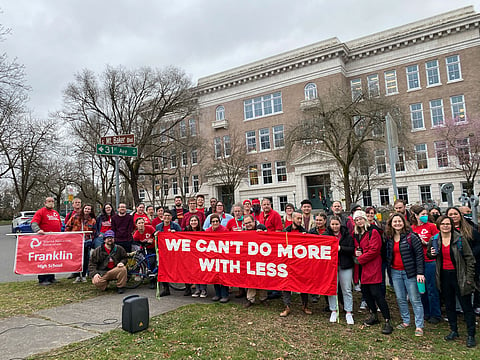Franklin High School Starts Teach-Ins in Response to Largest SPS Budget Deficit in Years: 'It's Crunch Time'
by Shamaar Thomas
On March 20, Seattle Public Schools (SPS) hosted an online event presenting information about its projected budget deficit for the 2023-2024 school year. SPS described the district's finances and established the concept of "well-resourced schools," but postponed providing information about staff and future school building plans until its "Community Engagement for Future Changes" engagement period begins in September. For South Seattle's Franklin High School, concerns are growing over staff and programming cuts because of this deficit. Although SPS announced that there will be no school closures for the 2023-2024 academic year, Franklin High School still has concerns about where resources are being allocated, teachers said.
SPS's projected budget deficit of $131 million mainly arises from enrollment rates dropping since fiscal year 2013-2014. SPS shared that because of Seattle families having fewer school-age children, the COVID-19 pandemic, and families sending their children to other entities, such as private schools, the projection will likely continue to drop moving forward.
In response, Franklin High School held a teach-in on the morning of March 21, discussing how its facilities need improvement for its students and why this projection should not lead SPS to cut already diminishing resources at Franklin High. Teachers and other staff carried a banner reading "We can't do more with less." Franklin High School teacher James Parker said staff and teachers at Franklin High School plan to host a weekly teach-in hopes of being heard.
Parker said he needs clarification about why resources are being cut instead of increased at Franklin High. Parker shared that Franklin plans to cut astronomy, AP physics, AP chemistry, and Latin American literature. These program cuts are happening on a campus that Parker said already cannot meet today's needs.
At the morning education teach-in, teachers said their school needs desks that students can fit in, batteries, outlets that don't blow up in the walls, safe drinking water, heat, and sustainable funds for counselors and staff.
According to Parker, Franklin High School last had a significant renovation in 1990, leaving many of its amenities past expiration. "Our worst nightmare is that we're understaffed and unable to serve the students," Parker said. "People feel siloed, voiceless, and I don't think we are an exception to SPS. Hopefully, this teach-in builds a stronger community in the future and provides daylight to what's really happening."
Vivian van Gelder, advocacy and policy manager with the Southeast Seattle Education Coalition, said the Franklin High School building "is in terrible shape" and that she hopes it is rebuilt to function for the students and the people working there. "The same can be said about systems the SPS still uses," Van Gelder said.
John Stanford — the man the Central District office building is named after — was superintendent during Franklin's last renovation. While much of the reform back then made sense, Van Gelder said that more than 30 years later, significant change is again necessary. "The structures that were put in place at that time are still in place now," Van Gelder said. "But things are very different today, and I think some of the problems that we're seeing [are] because of the disconnect between structures that were built in the '90s that are still trying to function now."
Appointed in March 2022, SPS Superintendent Brent Jones graduated from Franklin High School and hopes to transform organizational culture and support systems at Seattle schools, according to SPS's site. For Van Gelder, the question is whether Jones and his staff will enact structural change that benefits the community they have roots in and the entire school system, or whether SPS will continue to leave Seattle's public schools languishing in a system that doesn't address today's problems.
"Our Seattle schools are in a weird situation where they feel like they are their own school districts, each with their problems," Van Gelder said. Because schools feel siloed, she said, significant inequities pop up, and SPS needs to establish unity where every student gets the same access to resources.
SPS is required to pass and vote on a new 2023-2024 budget plan by Thursday, July 6, 2023.
"These problems have been building for a long time, especially with the pandemic putting things on hold," Van Gelder said. "But now, seemingly coming out of the pandemic, it's crunch time."
Shamaar Thomas is a freelance journalist, aspiring to be a full-time reporter/writer in the future. Graduating from the University of Washington with a bachelor's in journalism and a minor in diversity, Shamaar is excited to continue uplifting community voices with his articles. Washington grown, Shamaar hopes his journalism contributes to positive social change in the Pacific Northwest.
Featured image by Shamaar Thomas.
Before you move on to the next story …
The South Seattle Emerald™ is brought to you by Rainmakers. Rainmakers give recurring gifts at any amount. With around 1,000 Rainmakers, the Emerald™ is truly community-driven local media. Help us keep BIPOC-led media free and accessible.
If just half of our readers signed up to give $6 a month, we wouldn't have to fundraise for the rest of the year. Small amounts make a difference.
We cannot do this work without you. Become a Rainmaker today!
Help keep BIPOC-led, community-powered journalism free — become a Rainmaker today.


